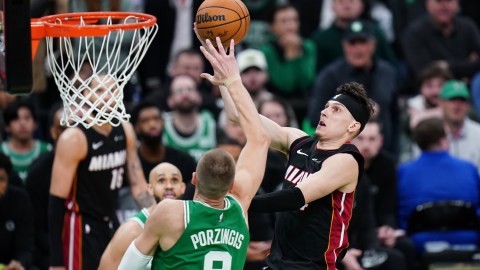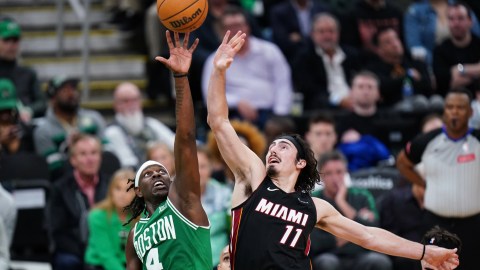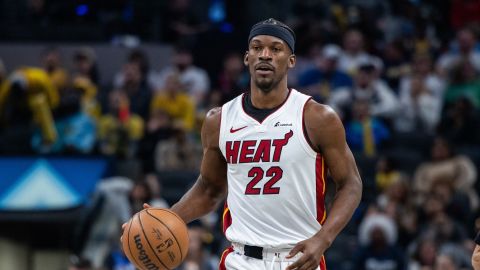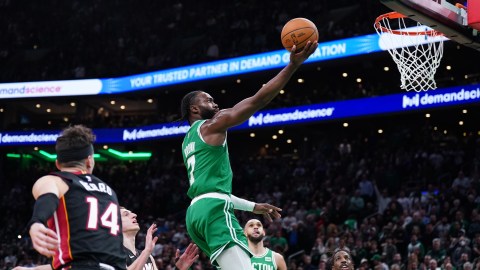Over the past few seasons, LeBron James has become a popular media punching bag for failing to deliver when it matters most. His teams' playoff struggles are well-documented: his Cavaliers had the league's best record in 2008-09 and 2009-10, but were upset by the Magic and Celtics, and LeBron famously wilted down the stretch in a six-game loss to the Mavericks in last year's NBA Finals.
But there are five players on every basketball team, and while LeBron, as a three-time MVP, is expected to create the lion's share of offense at the end of games, most critics tend to overlook the dearth of supporting options on James' teams. It's a lot harder to win games when the other team knows who's getting the ball in crunch time — just ask Kobe Bryant.
Obviously, James has Dwyane Wade for a teammate, but when facing a great defensive team like the Celtics, two options often aren't enough. Game 5 was a perfect example of why LeBron's teams have lost in the past — and why it's not his fault when they do.
The Heat had two players in double-digits Tuesday night: James, who scored a game-high 30 points, and Wade, who added 27. Contrast that to the Celtics, who had five players in double-digits, not counting Rajon Rondo, who shot just 3-for-15 from the field. Boston can absorb a bad game from their most important offensive player, because they have several scoring options behind Rondo.
Miami, on the other hand, saw great performances from its top two players, yet still lost because their seven remaining players combined for just 33 points. In the final 10:29 of Game 5, the Heat got just one field goal from someone not named James or Wade, whereas the Celtics got baskets from four different players, including a couple of huge threes from Mickael Pietrus. On defense, Miami had to account for every Celtic on the court down the stretch — Pietrus, Rondo, Kevin Garnett, Paul Pierce and Ray Allen. Boston doesn't have to pay the same respect to Shane Battier or Udonis Haslem.
This trend of poor teammates extends back to LeBron's Cleveland days, too. In Game 7 of the Eastern Conference semifinals in 2008, LeBron had 45 points against the eventual-champion Celtics, but it was not enough, as his Cavs fell on the road, 97-92. Cleveland's other starters for that game? Delonte West, Zydrunas Ilgauskas, Wally Szczerbiak and a washed-up Ben Wallace. That's a lottery team without James.
A year later, James averaged 38.5 points, 8.3 rebound and 8.0 assists in a six-game Conference Finals loss to the Magic. James scored 49 points on 20-for-30 shooting in a Game 1 loss, and the Cavs' two wins were entirely because of him: a one-point victory in Game 2 where James hit the game-winning three at the buzzer, and a 10-point win in Game 5 where LeBron submitted a ridiculous 37-point, 14-rebound, 12-assist performance. Then, as now, LeBron's team struggled because they had to deal with multiple threats on offense: Dwight Howard, Hedo Turkoglu and Rashard Lewis. Cleveland had a little more depth than in '08 after adding Mo Williams, but, short of averaging 50 points per game, the Cavs couldn't have asked much more of LeBron in that series.
LeBron should take some heat for his team's playoff exit the last two seasons, especially the 2011 NBA Finals, in which the forward engaged in a high-stakes game of hot potato with his teammates. James didn't just fail in the clutch last season — he refused to even get involved, lingering around the perimeter in the fourth quarter of losses in Games 4 and 5. But to call LeBron a choker, especially in this postseason, is unfair.
His playoff numbers — 29.9 ppg, 9.1 rpg, 5.3 apg — are in line with his those from his MVP-winning regular-season, though he is shooting a bit worse: 49.6 percent in the playoffs versus 53.1 percent during the regular season.
Miami simply isn't getting it done for the same reason they struggled early in the Indiana series: without Chris Bosh, they're playing 2-on-5 offensively and are forced to rely on James and Wade to play at an otherworldly level in order to win. They did that for five games, but asking them to do it for an entire postseason is just too much.



